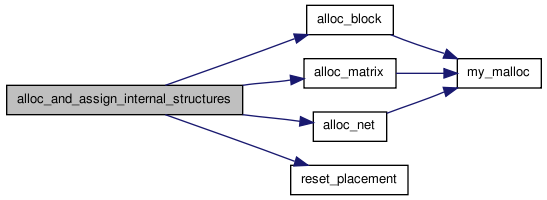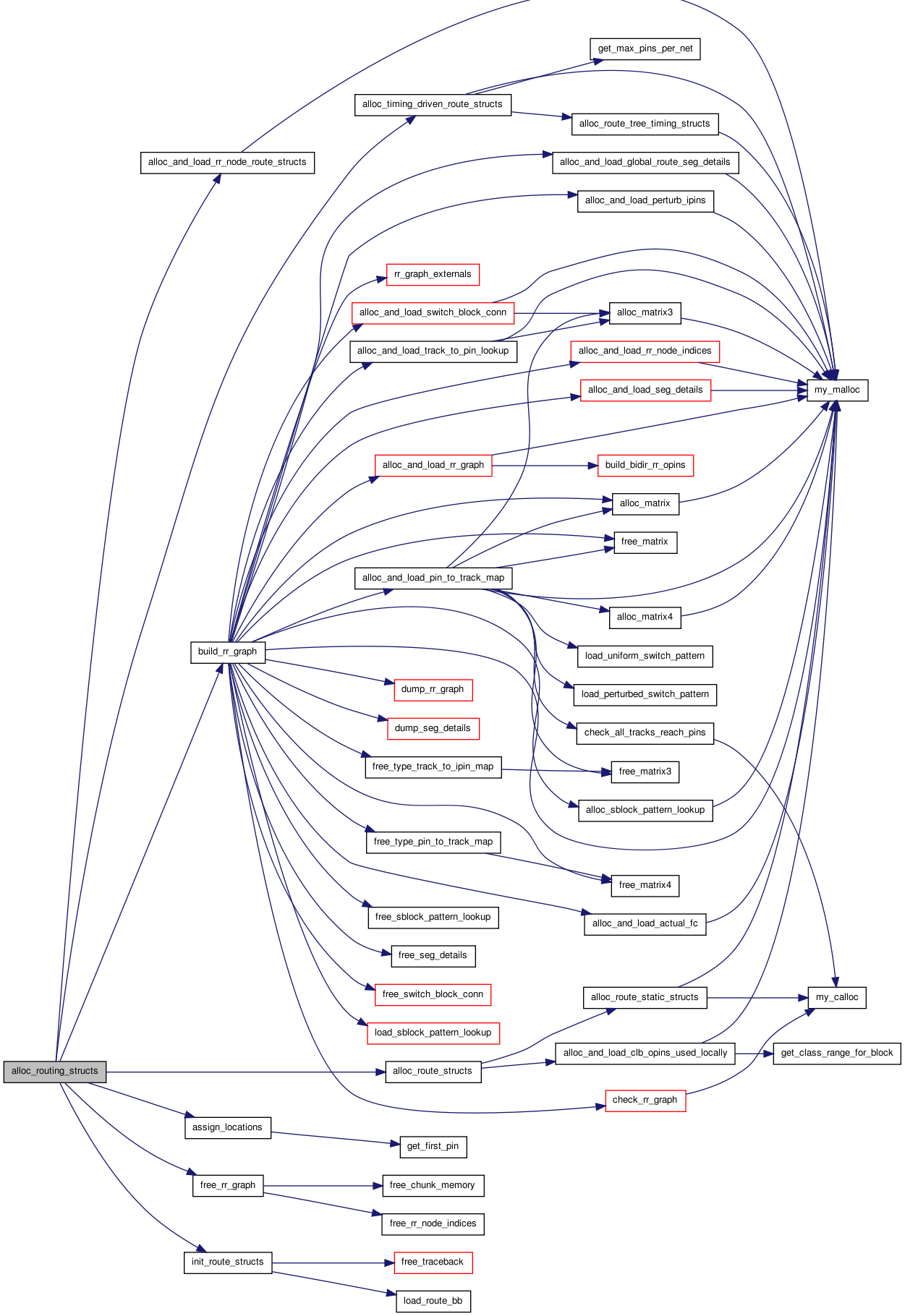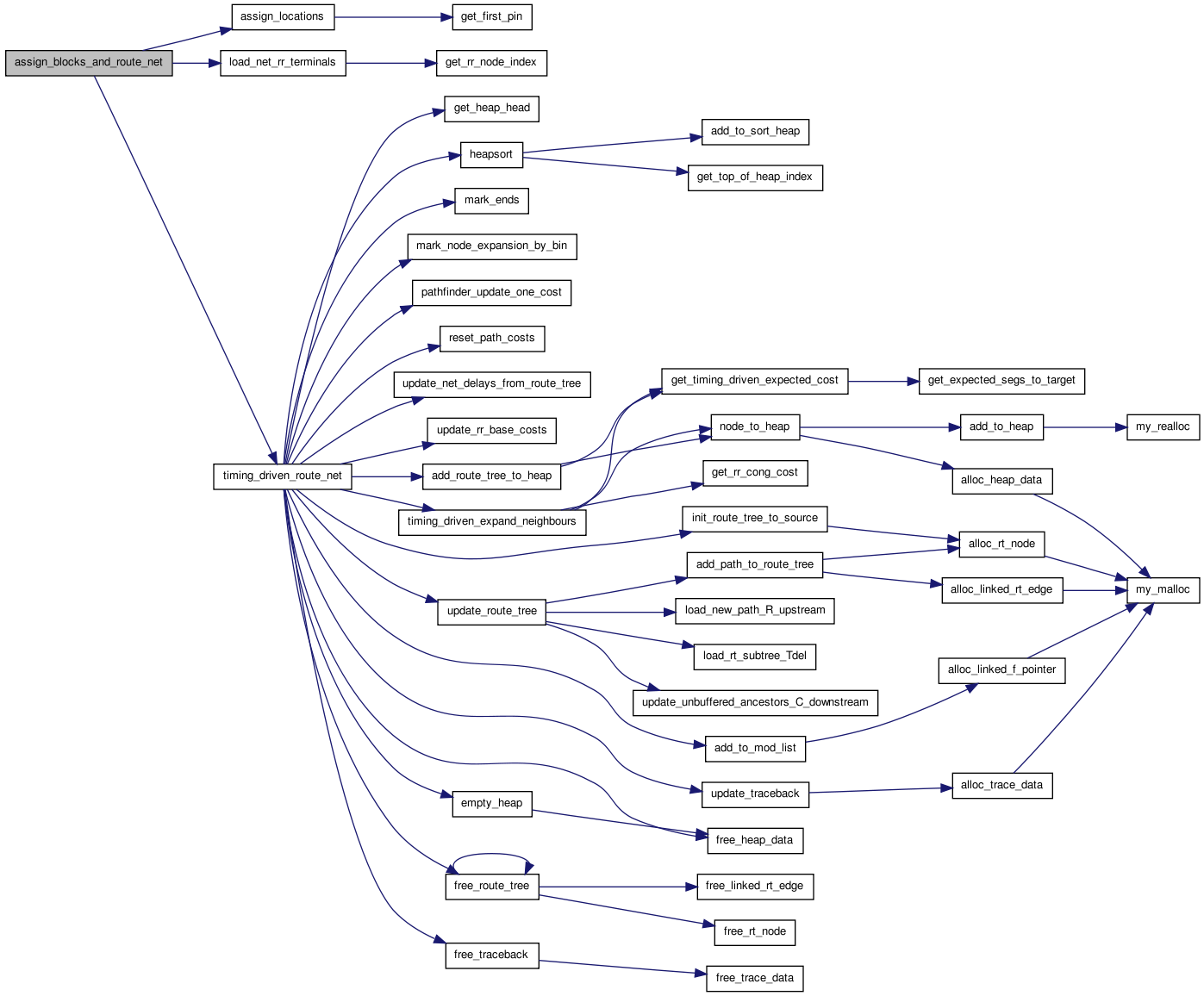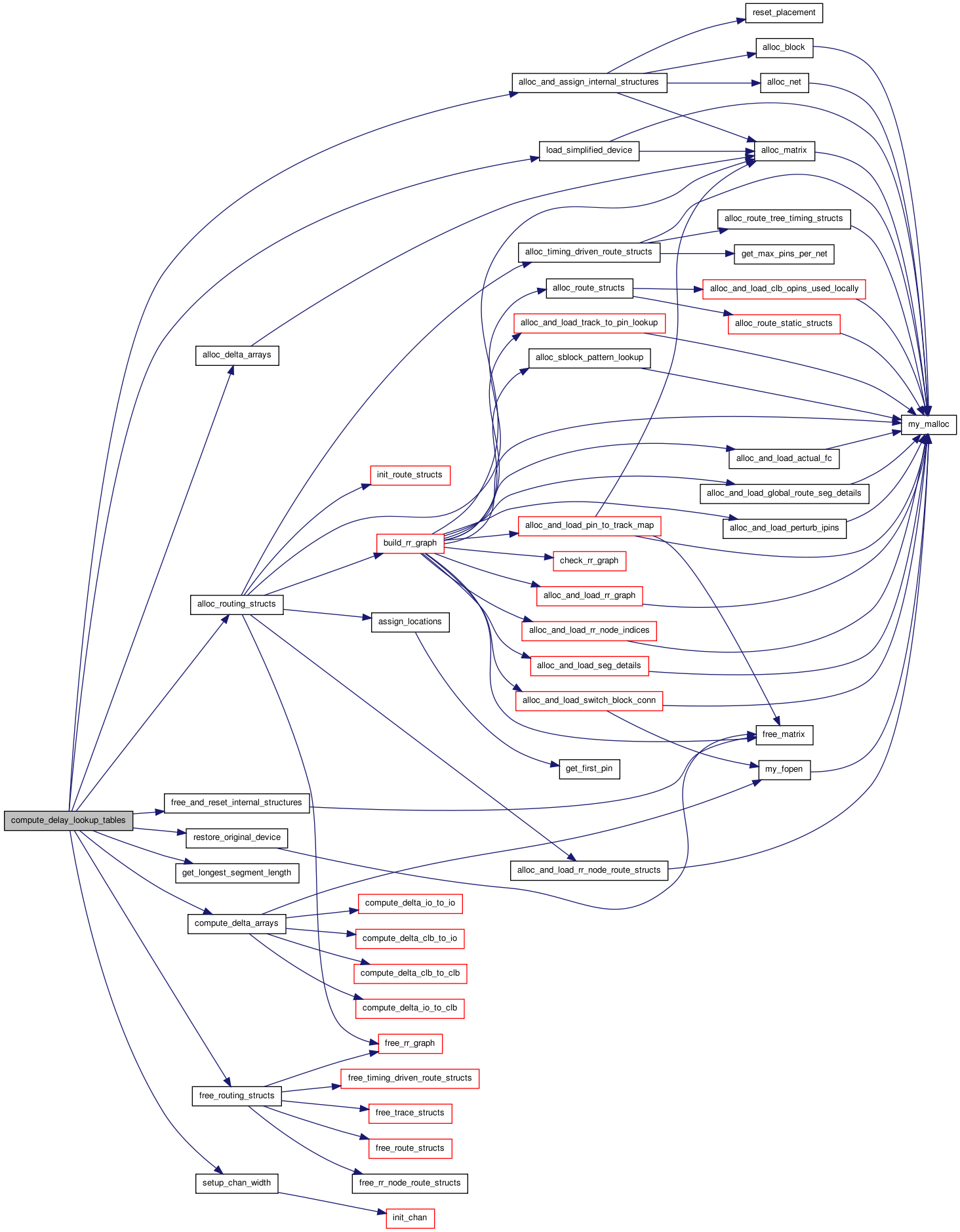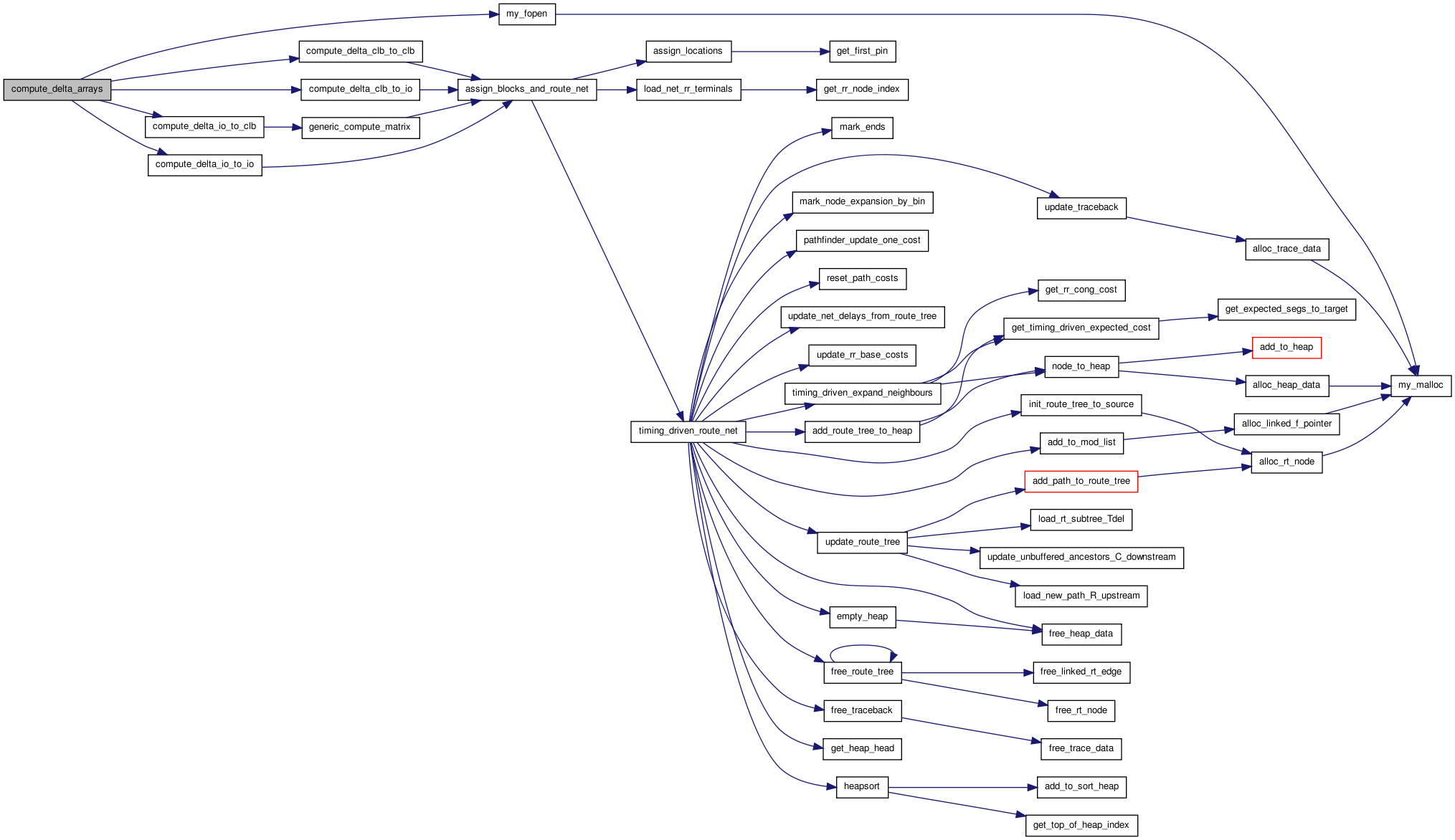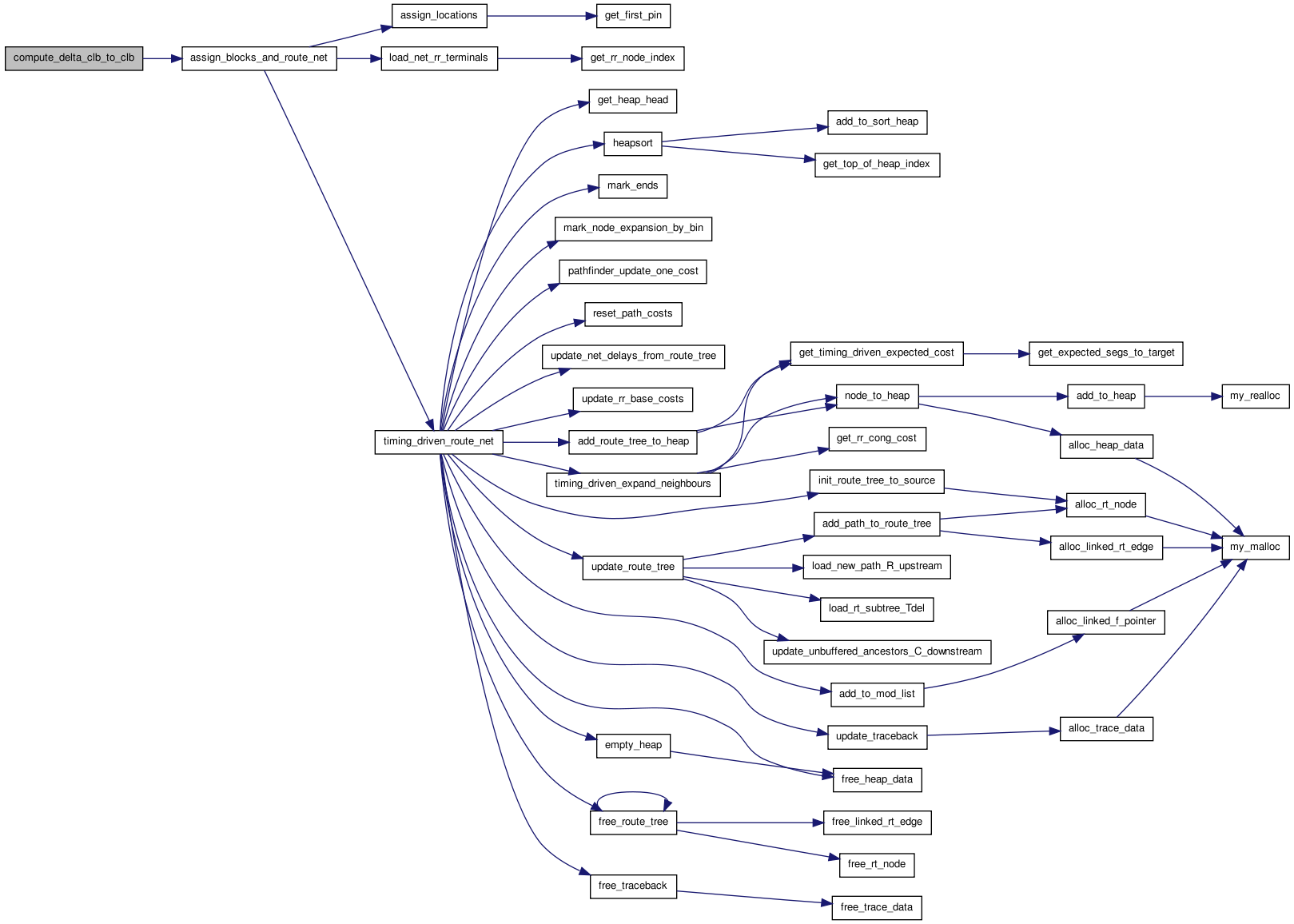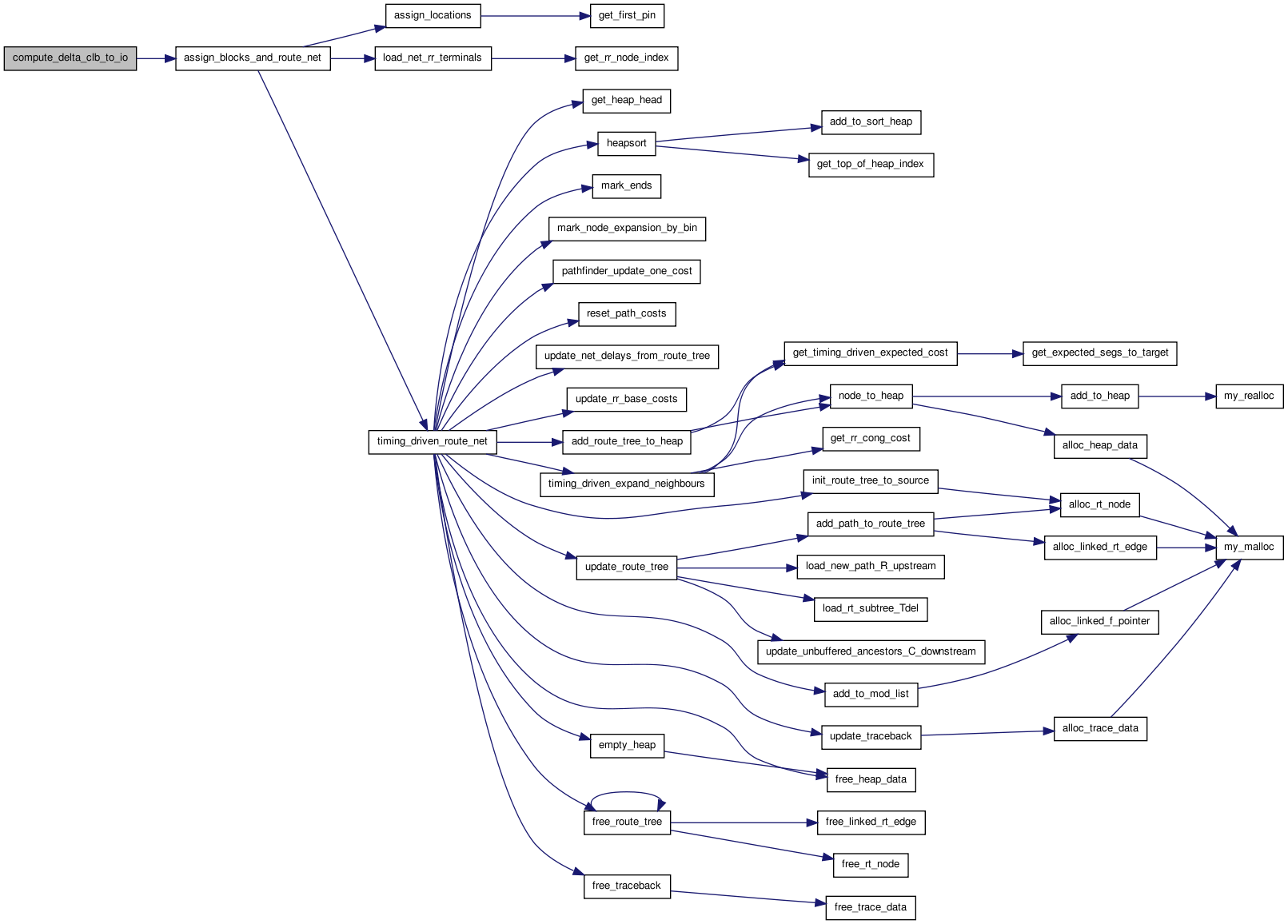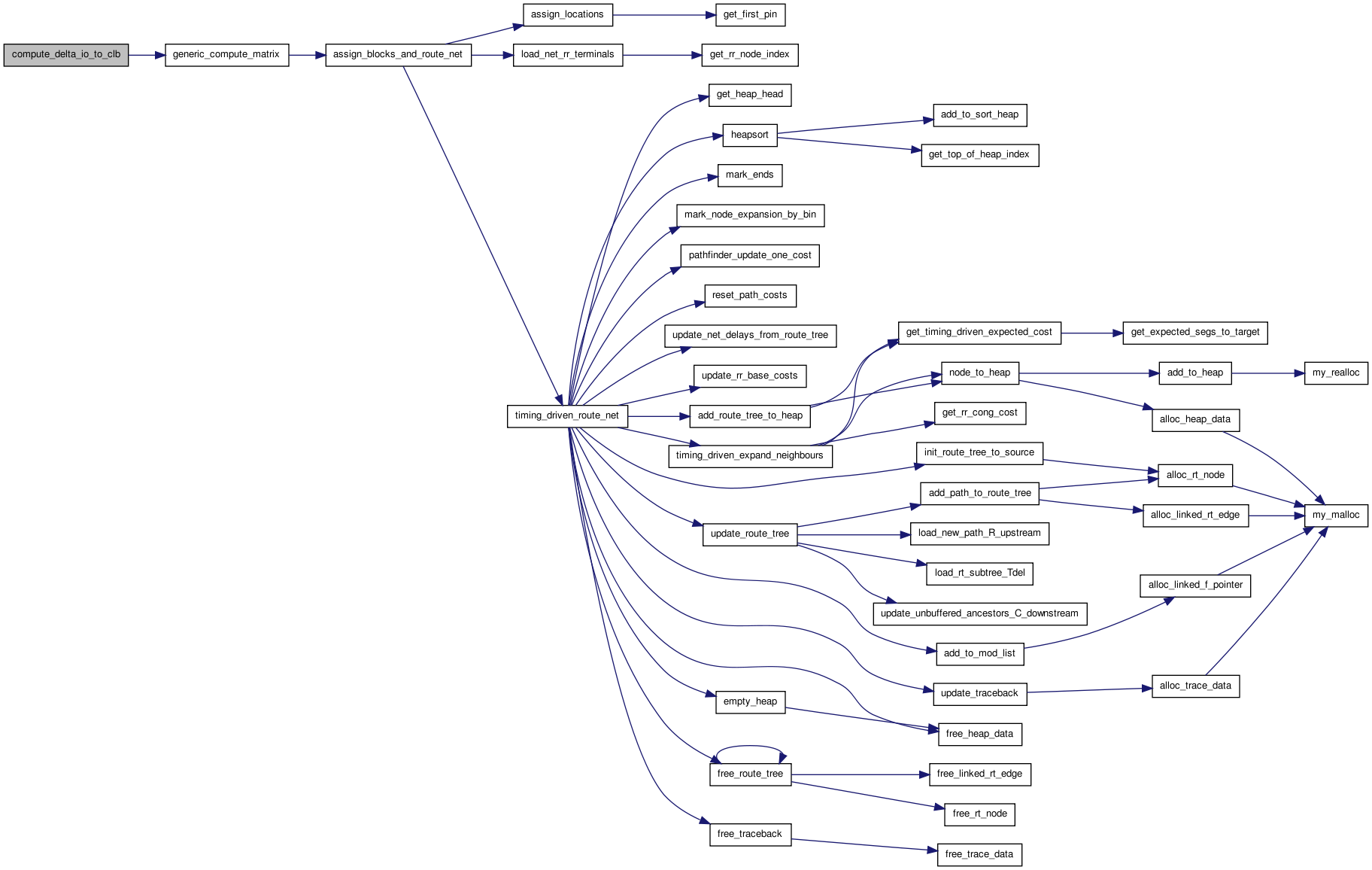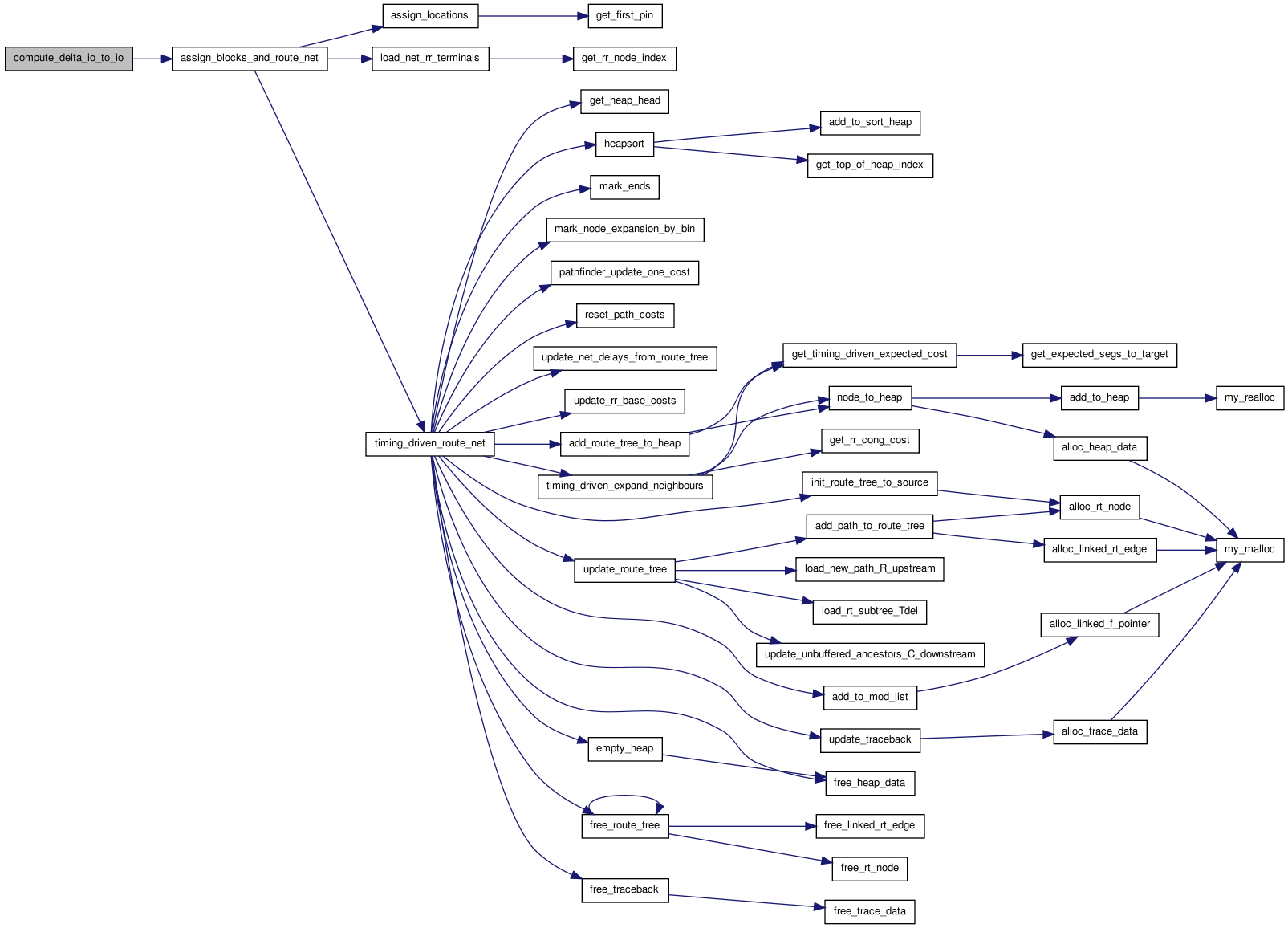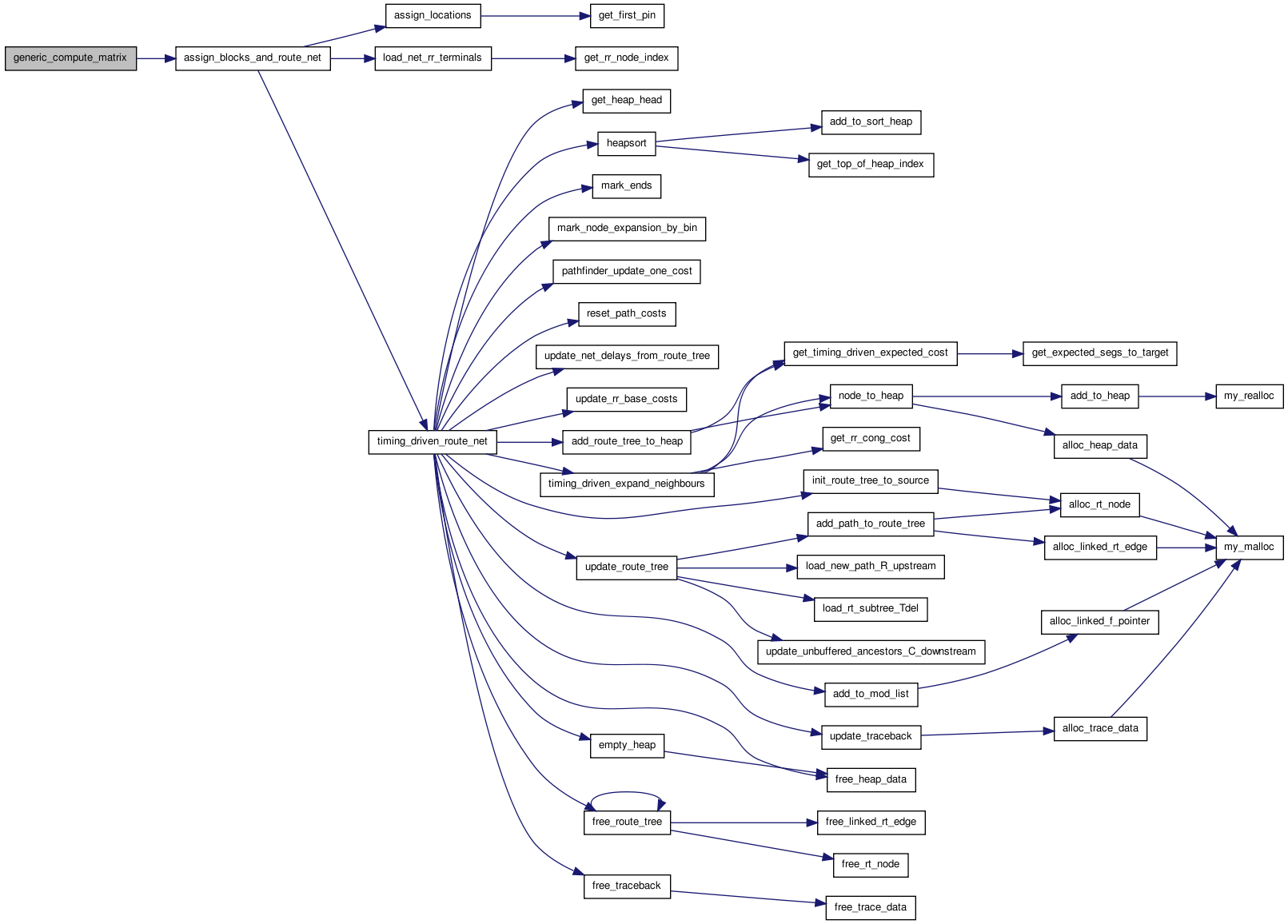#include <stdio.h>#include <math.h>#include <string.h>#include "util.h"#include "vpr_types.h"#include "globals.h"#include "route_common.h"#include "place_and_route.h"#include "route_tree_timing.h"#include "route_timing.h"#include "timing_place_lookup.h"#include "rr_graph.h"#include "mst.h"#include "route_export.h"#include <assert.h>#include "read_xml_arch_file.h" Include dependency graph for timing_place_lookup.c:
Include dependency graph for timing_place_lookup.c:Go to the source code of this file.
Defines | |
| #define | NET_COUNT 1 |
| #define | NET_USED 0 |
| #define | NET_USED_SOURCE_BLOCK 0 |
| #define | NET_USED_SINK_BLOCK 1 |
| #define | SOURCE_BLOCK 0 |
| #define | SINK_BLOCK 1 |
| #define | BLOCK_COUNT 2 |
| #define | NUM_TYPES_USED 3 |
| #define | DEBUG_TIMING_PLACE_LOOKUP |
| #define | DUMPFILE "lookup_dump.echo" |
Functions | |
| static void | alloc_net (void) |
| static void | alloc_block (void) |
| static void | load_simplified_device (void) |
| static void | restore_original_device (void) |
| static void | alloc_and_assign_internal_structures (struct s_net **original_net, struct s_block **original_block, int *original_num_nets, int *original_num_blocks) |
| static void | free_and_reset_internal_structures (struct s_net *original_net, struct s_block *original_block, int original_num_nets, int original_num_blocks) |
| static void | setup_chan_width (struct s_router_opts router_opts, t_chan_width_dist chan_width_dist) |
| static void | alloc_routing_structs (struct s_router_opts router_opts, struct s_det_routing_arch det_routing_arch, t_segment_inf *segment_inf, t_timing_inf timing_inf) |
| static void | free_routing_structs (struct s_router_opts router_opts, struct s_det_routing_arch det_routing_arch, t_segment_inf *segment_inf, t_timing_inf timing_inf) |
| static void | assign_locations (t_type_ptr source_type, int source_x_loc, int source_y_loc, int source_z_loc, t_type_ptr sink_type, int sink_x_loc, int sink_y_loc, int sink_z_loc) |
| static float | assign_blocks_and_route_net (t_type_ptr source_type, int source_x_loc, int source_y_loc, t_type_ptr sink_type, int sink_x_loc, int sink_y_loc, struct s_router_opts router_opts, struct s_det_routing_arch det_routing_arch, t_segment_inf *segment_inf, t_timing_inf timing_inf) |
| static void | alloc_delta_arrays (void) |
| static void | free_delta_arrays (void) |
| static void | generic_compute_matrix (float ***matrix_ptr, t_type_ptr source_type, t_type_ptr sink_type, int source_x, int source_y, int start_x, int end_x, int start_y, int end_y, struct s_router_opts router_opts, struct s_det_routing_arch det_routing_arch, t_segment_inf *segment_inf, t_timing_inf timing_inf) |
| static void | compute_delta_clb_to_clb (struct s_router_opts router_opts, struct s_det_routing_arch det_routing_arch, t_segment_inf *segment_inf, t_timing_inf timing_inf, int longest_length) |
| static void | compute_delta_io_to_clb (struct s_router_opts router_opts, struct s_det_routing_arch det_routing_arch, t_segment_inf *segment_inf, t_timing_inf timing_inf) |
| static void | compute_delta_clb_to_io (struct s_router_opts router_opts, struct s_det_routing_arch det_routing_arch, t_segment_inf *segment_inf, t_timing_inf timing_inf) |
| static void | compute_delta_io_to_io (struct s_router_opts router_opts, struct s_det_routing_arch det_routing_arch, t_segment_inf *segment_inf, t_timing_inf timing_inf) |
| static void | compute_delta_arrays (struct s_router_opts router_opts, struct s_det_routing_arch det_routing_arch, t_segment_inf *segment_inf, t_timing_inf timing_inf, int longest_length) |
| static int | get_first_pin (enum e_pin_type pintype, t_type_ptr type) |
| static int | get_longest_segment_length (struct s_det_routing_arch det_routing_arch, t_segment_inf *segment_inf) |
| static void | reset_placement (void) |
| void | compute_delay_lookup_tables (struct s_router_opts router_opts, struct s_det_routing_arch det_routing_arch, t_segment_inf *segment_inf, t_timing_inf timing_inf, t_chan_width_dist chan_width_dist) |
| void | free_place_lookup_structs (void) |
Variables | |
| static float ** | net_delay |
| static float ** | net_slack |
| static float * | pin_criticality |
| static int * | sink_order |
| static t_rt_node ** | rt_node_of_sink |
| static t_type_ptr | IO_TYPE_BACKUP |
| static t_type_ptr | EMPTY_TYPE_BACKUP |
| static t_type_ptr | FILL_TYPE_BACKUP |
| static t_type_descriptor | dummy_type_descriptors [NUM_TYPES_USED] |
| static t_type_descriptor * | type_descriptors_backup |
| static struct s_grid_tile ** | grid_backup |
| static int | num_types_backup |
| static t_ivec ** | clb_opins_used_locally |
| float ** | delta_io_to_clb |
| float ** | delta_clb_to_clb |
| float ** | delta_clb_to_io |
| float ** | delta_io_to_io |
Define Documentation
| #define BLOCK_COUNT 2 |
use 2 blocks to compute delay between the various FPGA locations do not change this number unless you really know what you are doing, it is assumed that the net only connects to two blocks
Definition at line 50 of file timing_place_lookup.c.
| #define DEBUG_TIMING_PLACE_LOOKUP |
initialize arrays to known state
Definition at line 59 of file timing_place_lookup.c.
| #define DUMPFILE "lookup_dump.echo" |
Definition at line 61 of file timing_place_lookup.c.
| #define NET_COUNT 1 |
we only use one net in these routines, it is repeatedly routed and ripped up to compute delays between different locations, this value should not change
Definition at line 40 of file timing_place_lookup.c.
| #define NET_USED 0 |
we use net at location zero of the net structure
Definition at line 44 of file timing_place_lookup.c.
| #define NET_USED_SINK_BLOCK 1 |
net.block[1] is sink block
Definition at line 46 of file timing_place_lookup.c.
| #define NET_USED_SOURCE_BLOCK 0 |
net.block[0] is source block
Definition at line 45 of file timing_place_lookup.c.
| #define NUM_TYPES_USED 3 |
number of types used in look up
Definition at line 57 of file timing_place_lookup.c.
| #define SINK_BLOCK 1 |
block[1] is sink
Definition at line 48 of file timing_place_lookup.c.
| #define SOURCE_BLOCK 0 |
block[0] is source
Definition at line 47 of file timing_place_lookup.c.
Function Documentation
| static void alloc_and_assign_internal_structures | ( | struct s_net ** | original_net, |
| struct s_block ** | original_block, | ||
| int * | original_num_nets, | ||
| int * | original_num_blocks | ||
| ) | [static] |
allocate new data structures to hold net, and block info
Definition at line 420 of file timing_place_lookup.c.
{
*original_net = clb_net;
*original_num_nets = num_nets;
num_nets = NET_COUNT;
alloc_net();
*original_block = block;
*original_num_blocks = num_blocks;
num_blocks = BLOCK_COUNT;
alloc_block();
/* [0..num_nets-1][1..num_pins-1] */
net_delay =
(float **)alloc_matrix(0, NET_COUNT - 1, 1, BLOCK_COUNT - 1,
sizeof(float));
net_slack =
(float **)alloc_matrix(0, NET_COUNT - 1, 1, BLOCK_COUNT - 1,
sizeof(float));
reset_placement();
}
 Here is the call graph for this function:
Here is the call graph for this function: Here is the caller graph for this function:
Here is the caller graph for this function:| static void alloc_block | ( | void | ) | [static] |
allocates block structure, and assigns values to known parameters type and x,y fields are left undefined at this stage since they are not known until we start moving blocks through the clb array
Definition at line 291 of file timing_place_lookup.c.
{
int ix_b, ix_p, len, i;
int max_pins;
max_pins = 0;
for(i = 0; i < NUM_TYPES_USED; i++)
{
max_pins = max(max_pins, type_descriptors[i].num_pins);
}
block = (struct s_block *)my_malloc(num_blocks * sizeof(struct s_block));
for(ix_b = 0; ix_b < BLOCK_COUNT; ix_b++)
{
len = strlen("TEMP_BLOCK");
block[ix_b].name = (char *)my_malloc((len + 1) * sizeof(char));
strcpy(block[ix_b].name, "TEMP_BLOCK");
block[ix_b].nets = (int *)my_malloc(max_pins * sizeof(int));
block[ix_b].nets[0] = 0;
for(ix_p = 1; ix_p < max_pins; ix_p++)
block[ix_b].nets[ix_p] = OPEN;
}
}
 Here is the call graph for this function:
Here is the call graph for this function: Here is the caller graph for this function:
Here is the caller graph for this function:| static void alloc_delta_arrays | ( | void | ) | [static] |
Definition at line 674 of file timing_place_lookup.c.
{
int id_x, id_y;
delta_clb_to_clb =
(float **)alloc_matrix(0, nx - 1, 0, ny - 1, sizeof(float));
delta_io_to_clb = (float **)alloc_matrix(0, nx, 0, ny, sizeof(float));
delta_clb_to_io = (float **)alloc_matrix(0, nx, 0, ny, sizeof(float));
delta_io_to_io =
(float **)alloc_matrix(0, nx + 1, 0, ny + 1, sizeof(float));
/*initialize all of the array locations to -1 */
for(id_x = 0; id_x <= nx; id_x++)
{
for(id_y = 0; id_y <= ny; id_y++)
{
delta_io_to_clb[id_x][id_y] = IMPOSSIBLE;
}
}
for(id_x = 0; id_x <= nx - 1; id_x++)
{
for(id_y = 0; id_y <= ny - 1; id_y++)
{
delta_clb_to_clb[id_x][id_y] = IMPOSSIBLE;
}
}
for(id_x = 0; id_x <= nx; id_x++)
{
for(id_y = 0; id_y <= ny; id_y++)
{
delta_clb_to_io[id_x][id_y] = IMPOSSIBLE;
}
}
for(id_x = 0; id_x <= nx + 1; id_x++)
{
for(id_y = 0; id_y <= ny + 1; id_y++)
{
delta_io_to_io[id_x][id_y] = IMPOSSIBLE;
}
}
}
 Here is the call graph for this function:
Here is the call graph for this function: Here is the caller graph for this function:
Here is the caller graph for this function:| static void alloc_net | ( | void | ) | [static] |
Definition at line 259 of file timing_place_lookup.c.
{
int i, len;
clb_net = (struct s_net *)my_malloc(num_nets * sizeof(struct s_net));
for(i = 0; i < NET_COUNT; i++)
{
/* FIXME: We *really* shouldn't be allocating write-once copies */
len = strlen("TEMP_NET");
clb_net[i].name = (char *)my_malloc((len + 1) * sizeof(char));
clb_net[i].is_global = FALSE;
strcpy(clb_net[NET_USED].name, "TEMP_NET");
clb_net[i].num_sinks = (BLOCK_COUNT - 1);
clb_net[i].node_block = (int *)my_malloc(BLOCK_COUNT * sizeof(int));
clb_net[i].node_block[NET_USED_SOURCE_BLOCK] = NET_USED_SOURCE_BLOCK; /*driving block */
clb_net[i].node_block[NET_USED_SINK_BLOCK] = NET_USED_SINK_BLOCK; /*target block */
clb_net[i].node_block_pin =
(int *)my_malloc(BLOCK_COUNT * sizeof(int));
/*the values for this are allocated in assign_blocks_and_route_net */
}
}
 Here is the call graph for this function:
Here is the call graph for this function: Here is the caller graph for this function:
Here is the caller graph for this function:| static void alloc_routing_structs | ( | struct s_router_opts | router_opts, |
| struct s_det_routing_arch | det_routing_arch, | ||
| t_segment_inf * | segment_inf, | ||
| t_timing_inf | timing_inf | ||
| ) | [static] |
calls routines that set up routing resource graph and associated structures
Definition at line 516 of file timing_place_lookup.c.
{
int bb_factor;
int warnings;
t_graph_type graph_type;
/*must set up dummy blocks for the first pass through to setup locally used opins */
/* Only one block per tile */
assign_locations(FILL_TYPE, 1, 1, 0, FILL_TYPE, nx, ny, 0);
clb_opins_used_locally = alloc_route_structs();
free_rr_graph();
if(router_opts.route_type == GLOBAL) {
graph_type = GRAPH_GLOBAL;
} else {
graph_type = (det_routing_arch.directionality ==
BI_DIRECTIONAL ? GRAPH_BIDIR : GRAPH_UNIDIR);
}
build_rr_graph(graph_type, num_types, dummy_type_descriptors, nx,
ny, grid, chan_width_x[0], NULL,
det_routing_arch.switch_block_type,
det_routing_arch.Fs, det_routing_arch.num_segment, det_routing_arch.num_switch,
segment_inf, det_routing_arch.global_route_switch,
det_routing_arch.delayless_switch, timing_inf,
det_routing_arch.wire_to_ipin_switch,
router_opts.base_cost_type, &warnings);
alloc_and_load_rr_node_route_structs();
alloc_timing_driven_route_structs(&pin_criticality, &sink_order,
&rt_node_of_sink);
bb_factor = nx + ny; /*set it to a huge value */
init_route_structs(bb_factor);
}
 Here is the call graph for this function:
Here is the call graph for this function: Here is the caller graph for this function:
Here is the caller graph for this function:| static float assign_blocks_and_route_net | ( | t_type_ptr | source_type, |
| int | source_x_loc, | ||
| int | source_y_loc, | ||
| t_type_ptr | sink_type, | ||
| int | sink_x_loc, | ||
| int | sink_y_loc, | ||
| struct s_router_opts | router_opts, | ||
| struct s_det_routing_arch | det_routing_arch, | ||
| t_segment_inf * | segment_inf, | ||
| t_timing_inf | timing_inf | ||
| ) | [static] |
places blocks at the specified locations, and routes a net between them
- Returns:
- the delay of this net
Definition at line 617 of file timing_place_lookup.c.
{
boolean is_routeable;
int ipin;
float pres_fac, T_crit;
float net_delay_value;
int source_z_loc, sink_z_loc;
/* Only one block per tile */
source_z_loc = 0;
sink_z_loc = 0;
net_delay_value = IMPOSSIBLE; /*set to known value for debug purposes */
assign_locations(source_type, source_x_loc, source_y_loc, source_z_loc,
sink_type, sink_x_loc, sink_y_loc, sink_z_loc);
load_net_rr_terminals(rr_node_indices);
T_crit = 1;
pres_fac = 0; /* ignore congestion */
for(ipin = 1; ipin <= clb_net[NET_USED].num_sinks; ipin++)
net_slack[NET_USED][ipin] = 0;
is_routeable = timing_driven_route_net(NET_USED, pres_fac,
router_opts.max_criticality,
router_opts.criticality_exp,
router_opts.astar_fac,
router_opts.bend_cost,
net_slack[NET_USED],
pin_criticality, sink_order,
rt_node_of_sink, T_crit,
net_delay[NET_USED]);
net_delay_value = net_delay[NET_USED][NET_USED_SINK_BLOCK];
grid[source_x_loc][source_y_loc].usage = 0;
grid[source_x_loc][source_y_loc].blocks[source_z_loc] = EMPTY;
grid[sink_x_loc][sink_y_loc].usage = 0;
grid[sink_x_loc][sink_y_loc].blocks[sink_z_loc] = EMPTY;
return (net_delay_value);
}
 Here is the call graph for this function:
Here is the call graph for this function: Here is the caller graph for this function:
Here is the caller graph for this function:| static void assign_locations | ( | t_type_ptr | source_type, |
| int | source_x_loc, | ||
| int | source_y_loc, | ||
| int | source_z_loc, | ||
| t_type_ptr | sink_type, | ||
| int | sink_x_loc, | ||
| int | sink_y_loc, | ||
| int | sink_z_loc | ||
| ) | [static] |
Definition at line 579 of file timing_place_lookup.c.
{
/*all routing occurs between block 0 (source) and block 1 (sink) */
block[SOURCE_BLOCK].type = source_type;
block[SOURCE_BLOCK].x = source_x_loc;
block[SOURCE_BLOCK].y = source_y_loc;
block[SOURCE_BLOCK].z = source_z_loc;
block[SINK_BLOCK].type = sink_type;
block[SINK_BLOCK].x = sink_x_loc;
block[SINK_BLOCK].y = sink_y_loc;
block[SINK_BLOCK].z = sink_z_loc;
grid[source_x_loc][source_y_loc].blocks[source_z_loc] = SOURCE_BLOCK;
grid[sink_x_loc][sink_y_loc].blocks[sink_z_loc] = SINK_BLOCK;
clb_net[NET_USED].node_block_pin[NET_USED_SOURCE_BLOCK] =
get_first_pin(DRIVER, block[SOURCE_BLOCK].type);
clb_net[NET_USED].node_block_pin[NET_USED_SINK_BLOCK] =
get_first_pin(RECEIVER, block[SINK_BLOCK].type);
grid[source_x_loc][source_y_loc].usage += 1;
grid[sink_x_loc][sink_y_loc].usage += 1;
}
 Here is the call graph for this function:
Here is the call graph for this function: Here is the caller graph for this function:
Here is the caller graph for this function:| void compute_delay_lookup_tables | ( | struct s_router_opts | router_opts, |
| struct s_det_routing_arch | det_routing_arch, | ||
| t_segment_inf * | segment_inf, | ||
| t_timing_inf | timing_inf, | ||
| t_chan_width_dist | chan_width_dist | ||
| ) |
Definition at line 1212 of file timing_place_lookup.c.
{
static struct s_net *original_net; /*this will be used as a pointer to remember what */
/*the "real" nets in the circuit are. This is */
/*required because we are using the net structure */
/*in these routines to find delays between blocks */
static struct s_block *original_block; /*same def as original_nets, but for block */
static int original_num_nets;
static int original_num_blocks;
static int longest_length;
load_simplified_device();
alloc_and_assign_internal_structures(&original_net,
&original_block,
&original_num_nets,
&original_num_blocks);
setup_chan_width(router_opts, chan_width_dist);
alloc_routing_structs(router_opts, det_routing_arch, segment_inf,
timing_inf);
longest_length =
get_longest_segment_length(det_routing_arch, segment_inf);
/*now setup and compute the actual arrays */
alloc_delta_arrays();
compute_delta_arrays(router_opts, det_routing_arch, segment_inf,
timing_inf, longest_length);
/*free all data structures that are no longer needed */
free_routing_structs(router_opts, det_routing_arch, segment_inf,
timing_inf);
restore_original_device();
free_and_reset_internal_structures(original_net, original_block,
original_num_nets,
original_num_blocks);
}
 Here is the call graph for this function:
Here is the call graph for this function: Here is the caller graph for this function:
Here is the caller graph for this function:| static void compute_delta_arrays | ( | struct s_router_opts | router_opts, |
| struct s_det_routing_arch | det_routing_arch, | ||
| t_segment_inf * | segment_inf, | ||
| t_timing_inf | timing_inf, | ||
| int | longest_length | ||
| ) | [static] |
Definition at line 1169 of file timing_place_lookup.c.
{
printf
("Computing delta_io_to_io lookup matrix, may take a few seconds, please wait...\n");
compute_delta_io_to_io(router_opts, det_routing_arch, segment_inf,
timing_inf);
printf
("Computing delta_io_to_clb lookup matrix, may take a few seconds, please wait...\n");
compute_delta_io_to_clb(router_opts, det_routing_arch, segment_inf,
timing_inf);
printf
("Computing delta_clb_to_io lookup matrix, may take a few seconds, please wait...\n");
compute_delta_clb_to_io(router_opts, det_routing_arch, segment_inf,
timing_inf);
printf
("Computing delta_clb_to_clb lookup matrix, may take a few seconds, please wait...\n");
compute_delta_clb_to_clb(router_opts, det_routing_arch, segment_inf,
timing_inf, longest_length);
#ifdef PRINT_ARRAYS
lookup_dump = my_fopen(DUMPFILE, "w", 0);
fprintf(lookup_dump, "\n\nprinting delta_clb_to_clb\n");
print_array(delta_clb_to_clb, 0, nx - 1, 0, ny - 1);
fprintf(lookup_dump, "\n\nprinting delta_io_to_clb\n");
print_array(delta_io_to_clb, 0, nx, 0, ny);
fprintf(lookup_dump, "\n\nprinting delta_clb_to_io\n");
print_array(delta_clb_to_io, 0, nx, 0, ny);
fprintf(lookup_dump, "\n\nprinting delta_io_to_io\n");
print_array(delta_io_to_io, 0, nx + 1, 0, ny + 1);
fclose(lookup_dump);
#endif
}
 Here is the call graph for this function:
Here is the call graph for this function: Here is the caller graph for this function:
Here is the caller graph for this function:| static void compute_delta_clb_to_clb | ( | struct s_router_opts | router_opts, |
| struct s_det_routing_arch | det_routing_arch, | ||
| t_segment_inf * | segment_inf, | ||
| t_timing_inf | timing_inf, | ||
| int | longest_length | ||
| ) | [static] |
this routine must compute delay values in a slightly different way than the other compute routines. We cannot use a location close to the edge as the source location for the majority of the delay computations because this would give gradually increasing delay values. To avoid this from happening a clb that is at least longest_length away from an edge should be chosen as a source , if longest_length is more than 0.5 of the total size then choose a CLB at the center as the source CLB
Definition at line 782 of file timing_place_lookup.c.
{
int source_x, source_y, sink_x, sink_y;
int start_x, start_y, end_x, end_y;
int delta_x, delta_y;
t_type_ptr source_type, sink_type;
source_type = FILL_TYPE;
sink_type = FILL_TYPE;
if(longest_length < 0.5 * (nx))
{
start_x = longest_length;
}
else
{
start_x = (int)(0.5 * nx);
}
end_x = nx;
source_x = start_x;
if(longest_length < 0.5 * (ny))
{
start_y = longest_length;
}
else
{
start_y = (int)(0.5 * ny);
}
end_y = ny;
source_y = start_y;
/*don't put the sink all the way to the corner, until it is necessary */
for(sink_x = start_x; sink_x <= end_x - 1; sink_x++)
{
for(sink_y = start_y; sink_y <= end_y - 1; sink_y++)
{
delta_x = abs(sink_x - source_x);
delta_y = abs(sink_y - source_y);
if(delta_x == 0 && delta_y == 0)
{
delta_clb_to_clb[delta_x][delta_y] = 0.0;
continue;
}
delta_clb_to_clb[delta_x][delta_y] =
assign_blocks_and_route_net(source_type, source_x,
source_y, sink_type,
sink_x, sink_y,
router_opts,
det_routing_arch,
segment_inf, timing_inf);
}
}
sink_x = end_x - 1;
sink_y = end_y - 1;
for(source_x = start_x - 1; source_x >= 1; source_x--)
{
for(source_y = start_y; source_y <= end_y - 1; source_y++)
{
delta_x = abs(sink_x - source_x);
delta_y = abs(sink_y - source_y);
delta_clb_to_clb[delta_x][delta_y] =
assign_blocks_and_route_net(source_type, source_x,
source_y, sink_type,
sink_x, sink_y,
router_opts,
det_routing_arch,
segment_inf, timing_inf);
}
}
for(source_x = 1; source_x <= end_x - 1; source_x++)
{
for(source_y = 1; source_y < start_y; source_y++)
{
delta_x = abs(sink_x - source_x);
delta_y = abs(sink_y - source_y);
delta_clb_to_clb[delta_x][delta_y] =
assign_blocks_and_route_net(source_type, source_x,
source_y, sink_type,
sink_x, sink_y,
router_opts,
det_routing_arch,
segment_inf, timing_inf);
}
}
/*now move sink into the top right corner */
sink_x = end_x;
sink_y = end_y;
source_x = 1;
for(source_y = 1; source_y <= end_y; source_y++)
{
delta_x = abs(sink_x - source_x);
delta_y = abs(sink_y - source_y);
delta_clb_to_clb[delta_x][delta_y] =
assign_blocks_and_route_net(source_type, source_x, source_y,
sink_type, sink_x, sink_y,
router_opts, det_routing_arch,
segment_inf, timing_inf);
}
sink_x = end_x;
sink_y = end_y;
source_y = 1;
for(source_x = 1; source_x <= end_x; source_x++)
{
delta_x = abs(sink_x - source_x);
delta_y = abs(sink_y - source_y);
delta_clb_to_clb[delta_x][delta_y] =
assign_blocks_and_route_net(source_type, source_x, source_y,
sink_type, sink_x, sink_y,
router_opts, det_routing_arch,
segment_inf, timing_inf);
}
}
 Here is the call graph for this function:
Here is the call graph for this function: Here is the caller graph for this function:
Here is the caller graph for this function:| static void compute_delta_clb_to_io | ( | struct s_router_opts | router_opts, |
| struct s_det_routing_arch | det_routing_arch, | ||
| t_segment_inf * | segment_inf, | ||
| t_timing_inf | timing_inf | ||
| ) | [static] |
Definition at line 969 of file timing_place_lookup.c.
{
int source_x, source_y, sink_x, sink_y;
int delta_x, delta_y;
t_type_ptr source_type, sink_type;
source_type = FILL_TYPE;
sink_type = IO_TYPE;
delta_clb_to_io[0][0] = IMPOSSIBLE;
delta_clb_to_io[nx][ny] = IMPOSSIBLE;
sink_x = 0;
sink_y = 1;
for(source_x = 1; source_x <= nx; source_x++)
{
for(source_y = 1; source_y <= ny; source_y++)
{
delta_x = abs(source_x - sink_x);
delta_y = abs(source_y - sink_y);
delta_clb_to_io[delta_x][delta_y] =
assign_blocks_and_route_net(source_type, source_x,
source_y, sink_type,
sink_x, sink_y,
router_opts,
det_routing_arch,
segment_inf, timing_inf);
}
}
sink_x = 1;
sink_y = 0;
source_x = 1;
delta_x = abs(source_x - sink_x);
for(source_y = 1; source_y <= ny; source_y++)
{
delta_y = abs(source_y - sink_y);
delta_clb_to_io[delta_x][delta_y] =
assign_blocks_and_route_net(source_type, source_x, source_y,
sink_type, sink_x, sink_y,
router_opts, det_routing_arch,
segment_inf, timing_inf);
}
sink_x = 1;
sink_y = 0;
source_y = ny;
delta_y = abs(source_y - sink_y);
for(source_x = 2; source_x <= nx; source_x++)
{
delta_x = abs(source_x - sink_x);
delta_clb_to_io[delta_x][delta_y] =
assign_blocks_and_route_net(source_type, source_x, source_y,
sink_type, sink_x, sink_y,
router_opts, det_routing_arch,
segment_inf, timing_inf);
}
}
 Here is the call graph for this function:
Here is the call graph for this function: Here is the caller graph for this function:
Here is the caller graph for this function:| static void compute_delta_io_to_clb | ( | struct s_router_opts | router_opts, |
| struct s_det_routing_arch | det_routing_arch, | ||
| t_segment_inf * | segment_inf, | ||
| t_timing_inf | timing_inf | ||
| ) | [static] |
Definition at line 918 of file timing_place_lookup.c.
{
int source_x, source_y;
int start_x, start_y, end_x, end_y;
t_type_ptr source_type, sink_type;
source_type = IO_TYPE;
sink_type = FILL_TYPE;
delta_io_to_clb[0][0] = IMPOSSIBLE;
delta_io_to_clb[nx][ny] = IMPOSSIBLE;
source_x = 0;
source_y = 1;
start_x = 1;
end_x = nx;
start_y = 1;
end_y = ny;
generic_compute_matrix(&delta_io_to_clb, source_type, sink_type,
source_x, source_y, start_x, end_x, start_y,
end_y, router_opts, det_routing_arch,
segment_inf, timing_inf);
source_x = 1;
source_y = 0;
start_x = 1;
end_x = 1;
start_y = 1;
end_y = ny;
generic_compute_matrix(&delta_io_to_clb, source_type, sink_type,
source_x, source_y, start_x, end_x, start_y,
end_y, router_opts, det_routing_arch,
segment_inf, timing_inf);
start_x = 1;
end_x = nx;
start_y = ny;
end_y = ny;
generic_compute_matrix(&delta_io_to_clb, source_type, sink_type,
source_x, source_y, start_x, end_x, start_y,
end_y, router_opts, det_routing_arch,
segment_inf, timing_inf);
}
 Here is the call graph for this function:
Here is the call graph for this function: Here is the caller graph for this function:
Here is the caller graph for this function:| static void compute_delta_io_to_io | ( | struct s_router_opts | router_opts, |
| struct s_det_routing_arch | det_routing_arch, | ||
| t_segment_inf * | segment_inf, | ||
| t_timing_inf | timing_inf | ||
| ) | [static] |
Definition at line 1034 of file timing_place_lookup.c.
{
int source_x, source_y, sink_x, sink_y;
int delta_x, delta_y;
t_type_ptr source_type, sink_type;
source_type = IO_TYPE;
sink_type = IO_TYPE;
delta_io_to_io[0][0] = 0; /*delay to itself is 0 (this can happen) */
delta_io_to_io[nx + 1][ny + 1] = IMPOSSIBLE;
delta_io_to_io[0][ny] = IMPOSSIBLE;
delta_io_to_io[nx][0] = IMPOSSIBLE;
delta_io_to_io[nx][ny + 1] = IMPOSSIBLE;
delta_io_to_io[nx + 1][ny] = IMPOSSIBLE;
source_x = 0;
source_y = 1;
sink_x = 0;
delta_x = abs(sink_x - source_x);
for(sink_y = 2; sink_y <= ny; sink_y++)
{
delta_y = abs(sink_y - source_y);
delta_io_to_io[delta_x][delta_y] =
assign_blocks_and_route_net(source_type, source_x, source_y,
sink_type, sink_x, sink_y,
router_opts, det_routing_arch,
segment_inf, timing_inf);
}
source_x = 0;
source_y = 1;
sink_x = nx + 1;
delta_x = abs(sink_x - source_x);
for(sink_y = 1; sink_y <= ny; sink_y++)
{
delta_y = abs(sink_y - source_y);
delta_io_to_io[delta_x][delta_y] =
assign_blocks_and_route_net(source_type, source_x, source_y,
sink_type, sink_x, sink_y,
router_opts, det_routing_arch,
segment_inf, timing_inf);
}
source_x = 1;
source_y = 0;
sink_y = 0;
delta_y = abs(sink_y - source_y);
for(sink_x = 2; sink_x <= nx; sink_x++)
{
delta_x = abs(sink_x - source_x);
delta_io_to_io[delta_x][delta_y] =
assign_blocks_and_route_net(source_type, source_x, source_y,
sink_type, sink_x, sink_y,
router_opts, det_routing_arch,
segment_inf, timing_inf);
}
source_x = 1;
source_y = 0;
sink_y = ny + 1;
delta_y = abs(sink_y - source_y);
for(sink_x = 1; sink_x <= nx; sink_x++)
{
delta_x = abs(sink_x - source_x);
delta_io_to_io[delta_x][delta_y] =
assign_blocks_and_route_net(source_type, source_x, source_y,
sink_type, sink_x, sink_y,
router_opts, det_routing_arch,
segment_inf, timing_inf);
}
source_x = 0;
sink_y = ny + 1;
for(source_y = 1; source_y <= ny; source_y++)
{
for(sink_x = 1; sink_x <= nx; sink_x++)
{
delta_y = abs(source_y - sink_y);
delta_x = abs(source_x - sink_x);
delta_io_to_io[delta_x][delta_y] =
assign_blocks_and_route_net(source_type, source_x,
source_y, sink_type,
sink_x, sink_y,
router_opts,
det_routing_arch,
segment_inf, timing_inf);
}
}
}
 Here is the call graph for this function:
Here is the call graph for this function: Here is the caller graph for this function:
Here is the caller graph for this function:| static void free_and_reset_internal_structures | ( | struct s_net * | original_net, |
| struct s_block * | original_block, | ||
| int | original_num_nets, | ||
| int | original_num_blocks | ||
| ) | [static] |
reset gloabal data structures to the state that they were in before these lookup computation routines were called
Definition at line 453 of file timing_place_lookup.c.
{
int i;
/*there should be only one net to free, but this is safer */
for(i = 0; i < NET_COUNT; i++)
{
free(clb_net[i].name);
free(clb_net[i].node_block);
free(clb_net[i].node_block_pin);
}
free(clb_net);
clb_net = original_net;
for(i = 0; i < BLOCK_COUNT; i++)
{
free(block[i].name);
free(block[i].nets);
}
free(block);
block = original_block;
num_nets = original_num_nets;
num_blocks = original_num_blocks;
free_matrix(net_delay, 0, NET_COUNT - 1, 1, sizeof(float));
free_matrix(net_slack, 0, NET_COUNT - 1, 1, sizeof(float));
}
 Here is the call graph for this function:
Here is the call graph for this function: Here is the caller graph for this function:
Here is the caller graph for this function:| static void free_delta_arrays | ( | void | ) | [static] |
Definition at line 720 of file timing_place_lookup.c.
{
free_matrix(delta_io_to_clb, 0, nx, 0, sizeof(float));
free_matrix(delta_clb_to_clb, 0, nx - 1, 0, sizeof(float));
free_matrix(delta_clb_to_io, 0, nx, 0, sizeof(float));
free_matrix(delta_io_to_io, 0, nx + 1, 0, sizeof(float));
}
 Here is the call graph for this function:
Here is the call graph for this function: Here is the caller graph for this function:
Here is the caller graph for this function:| void free_place_lookup_structs | ( | void | ) |
Definition at line 1263 of file timing_place_lookup.c.
{
free_delta_arrays();
}
 Here is the call graph for this function:
Here is the call graph for this function:| static void free_routing_structs | ( | struct s_router_opts | router_opts, |
| struct s_det_routing_arch | det_routing_arch, | ||
| t_segment_inf * | segment_inf, | ||
| t_timing_inf | timing_inf | ||
| ) | [static] |
Definition at line 562 of file timing_place_lookup.c.
{
free_rr_graph();
free_rr_node_route_structs();
free_route_structs(clb_opins_used_locally);
free_trace_structs();
free_timing_driven_route_structs(pin_criticality, sink_order,
rt_node_of_sink);
}
 Here is the call graph for this function:
Here is the call graph for this function: Here is the caller graph for this function:
Here is the caller graph for this function:| static void generic_compute_matrix | ( | float *** | matrix_ptr, |
| t_type_ptr | source_type, | ||
| t_type_ptr | sink_type, | ||
| int | source_x, | ||
| int | source_y, | ||
| int | start_x, | ||
| int | end_x, | ||
| int | start_y, | ||
| int | end_y, | ||
| struct s_router_opts | router_opts, | ||
| struct s_det_routing_arch | det_routing_arch, | ||
| t_segment_inf * | segment_inf, | ||
| t_timing_inf | timing_inf | ||
| ) | [static] |
Definition at line 732 of file timing_place_lookup.c.
{
int delta_x, delta_y;
int sink_x, sink_y;
for(sink_x = start_x; sink_x <= end_x; sink_x++)
{
for(sink_y = start_y; sink_y <= end_y; sink_y++)
{
delta_x = abs(sink_x - source_x);
delta_y = abs(sink_y - source_y);
if(delta_x == 0 && delta_y == 0)
continue; /*do not compute distance from a block to itself */
/*if a value is desired, pre-assign it somewhere else */
(*matrix_ptr)[delta_x][delta_y] =
assign_blocks_and_route_net(source_type, source_x,
source_y, sink_type,
sink_x, sink_y,
router_opts,
det_routing_arch,
segment_inf, timing_inf);
}
}
}
 Here is the call graph for this function:
Here is the call graph for this function: Here is the caller graph for this function:
Here is the caller graph for this function:| static int get_first_pin | ( | enum e_pin_type | pintype, |
| t_type_ptr | type | ||
| ) | [static] |
this code assumes logical equivilance between all driving pins global pins are not hooked up to the temporary net
Definition at line 221 of file timing_place_lookup.c.
{
int i, currpin;
currpin = 0;
for(i = 0; i < type->num_class; i++)
{
if(type->class_inf[i].type == pintype
&& !type->is_global_pin[currpin])
return (type->class_inf[i].pinlist[0]);
else
currpin += type->class_inf[i].num_pins;
}
assert(0);
exit(0); /*should never hit this line */
}
 Here is the caller graph for this function:
Here is the caller graph for this function:| static int get_longest_segment_length | ( | struct s_det_routing_arch | det_routing_arch, |
| t_segment_inf * | segment_inf | ||
| ) | [static] |
Definition at line 242 of file timing_place_lookup.c.
{
int i, length;
length = 0;
for(i = 0; i < det_routing_arch.num_segment; i++)
{
if(segment_inf[i].length > length)
length = segment_inf[i].length;
}
return (length);
}
 Here is the caller graph for this function:
Here is the caller graph for this function:| static void load_simplified_device | ( | void | ) | [static] |
Definition at line 320 of file timing_place_lookup.c.
{
int i, j;
/* Backup original globals */
EMPTY_TYPE_BACKUP = EMPTY_TYPE;
IO_TYPE_BACKUP = IO_TYPE;
FILL_TYPE_BACKUP = FILL_TYPE;
type_descriptors_backup = type_descriptors;
num_types_backup = num_types;
num_types = NUM_TYPES_USED;
/* Fill in homogeneous core type info */
dummy_type_descriptors[0] = *EMPTY_TYPE;
dummy_type_descriptors[0].index = 0;
dummy_type_descriptors[1] = *IO_TYPE;
dummy_type_descriptors[1].index = 1;
dummy_type_descriptors[2] = *FILL_TYPE;
dummy_type_descriptors[2].index = 2;
type_descriptors = dummy_type_descriptors;
EMPTY_TYPE = &dummy_type_descriptors[0];
IO_TYPE = &dummy_type_descriptors[1];
FILL_TYPE = &dummy_type_descriptors[2];
/* Fill in homogeneous core grid info */
grid_backup = grid;
grid =
(struct s_grid_tile **)alloc_matrix(0, nx + 1, 0, ny + 1,
sizeof(struct s_grid_tile));
for(i = 0; i < nx + 2; i++)
{
for(j = 0; j < ny + 2; j++)
{
if((i == 0 && j == 0) ||
(i == nx + 1 && j == 0) ||
(i == 0 && j == ny + 1) || (i == nx + 1
&& j == ny + 1))
{
grid[i][j].type = EMPTY_TYPE;
}
else if(i == 0 || i == nx + 1 || j == 0 || j == ny + 1)
{
grid[i][j].type = IO_TYPE;
}
else
{
grid[i][j].type = FILL_TYPE;
}
grid[i][j].blocks =
my_malloc(grid[i][j].type->capacity * sizeof(int));
grid[i][j].offset = 0;
}
}
}
 Here is the call graph for this function:
Here is the call graph for this function: Here is the caller graph for this function:
Here is the caller graph for this function:| static void reset_placement | ( | void | ) | [static] |
| static void restore_original_device | ( | void | ) | [static] |
Definition at line 375 of file timing_place_lookup.c.
{
int i, j;
/* restore previous globals */
IO_TYPE = IO_TYPE_BACKUP;
EMPTY_TYPE = EMPTY_TYPE_BACKUP;
FILL_TYPE = FILL_TYPE_BACKUP;
type_descriptors = type_descriptors_backup;
num_types = num_types_backup;
/* free allocatd data */
for(i = 0; i < nx + 2; i++)
{
for(j = 0; j < ny + 2; j++)
{
free(grid[i][j].blocks);
}
}
free_matrix(grid, 0, nx + 1, 0, sizeof(struct s_grid_tile));
grid = grid_backup;
}
 Here is the call graph for this function:
Here is the call graph for this function: Here is the caller graph for this function:
Here is the caller graph for this function:| static void setup_chan_width | ( | struct s_router_opts | router_opts, |
| t_chan_width_dist | chan_width_dist | ||
| ) | [static] |
we give plenty of tracks, this increases routability for the lookup table generation
Definition at line 491 of file timing_place_lookup.c.
{
int width_fac, i, max_pins_per_clb;
max_pins_per_clb = 0;
for(i = 0; i < num_types; i++)
{
max_pins_per_clb =
max(max_pins_per_clb, type_descriptors[i].num_pins);
}
if(router_opts.fixed_channel_width == NO_FIXED_CHANNEL_WIDTH)
width_fac = 4 * max_pins_per_clb; /*this is 2x the value that binary search starts */
/*this should be enough to allow most pins to */
/*connect to tracks in the architecture */
else
width_fac = router_opts.fixed_channel_width;
init_chan(width_fac, chan_width_dist);
}
 Here is the call graph for this function:
Here is the call graph for this function: Here is the caller graph for this function:
Here is the caller graph for this function:Variable Documentation
t_ivec** clb_opins_used_locally [static] |
Definition at line 95 of file timing_place_lookup.c.
| float** delta_clb_to_clb |
<only used during debugging, calls routine to print out the various lookup arrays the delta arrays are used to contain the best case routing delay between different locations on the FPGA.
Definition at line 72 of file timing_place_lookup.c.
| float** delta_clb_to_io |
<only used during debugging, calls routine to print out the various lookup arrays the delta arrays are used to contain the best case routing delay between different locations on the FPGA.
Definition at line 73 of file timing_place_lookup.c.
| float** delta_io_to_clb |
<only used during debugging, calls routine to print out the various lookup arrays the delta arrays are used to contain the best case routing delay between different locations on the FPGA.
Definition at line 71 of file timing_place_lookup.c.
| float** delta_io_to_io |
<only used during debugging, calls routine to print out the various lookup arrays the delta arrays are used to contain the best case routing delay between different locations on the FPGA.
Definition at line 74 of file timing_place_lookup.c.
t_type_descriptor dummy_type_descriptors[NUM_TYPES_USED] [static] |
Definition at line 90 of file timing_place_lookup.c.
t_type_ptr EMPTY_TYPE_BACKUP [static] |
Definition at line 88 of file timing_place_lookup.c.
t_type_ptr FILL_TYPE_BACKUP [static] |
Definition at line 89 of file timing_place_lookup.c.
struct s_grid_tile** grid_backup [static] |
Definition at line 92 of file timing_place_lookup.c.
t_type_ptr IO_TYPE_BACKUP [static] |
Definition at line 87 of file timing_place_lookup.c.
float** net_delay [static] |
Definition at line 82 of file timing_place_lookup.c.
float** net_slack [static] |
Definition at line 83 of file timing_place_lookup.c.
int num_types_backup [static] |
Definition at line 93 of file timing_place_lookup.c.
float* pin_criticality [static] |
Definition at line 84 of file timing_place_lookup.c.
t_rt_node** rt_node_of_sink [static] |
Definition at line 86 of file timing_place_lookup.c.
int* sink_order [static] |
Definition at line 85 of file timing_place_lookup.c.
t_type_descriptor* type_descriptors_backup [static] |
Definition at line 91 of file timing_place_lookup.c.

